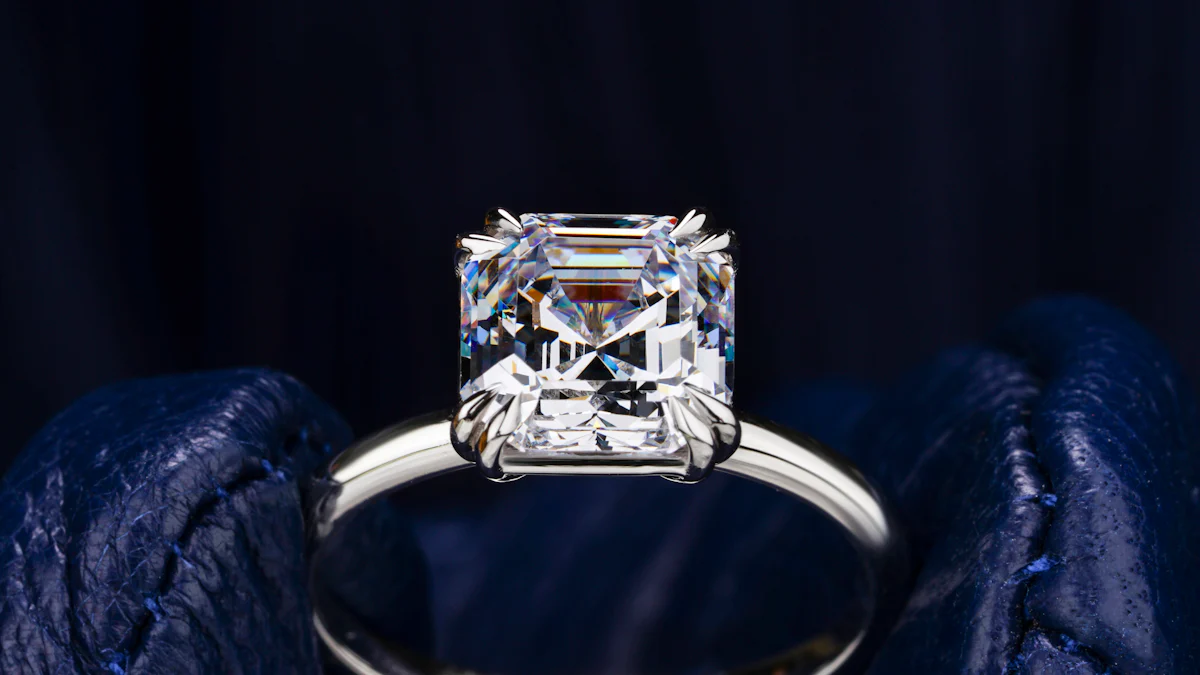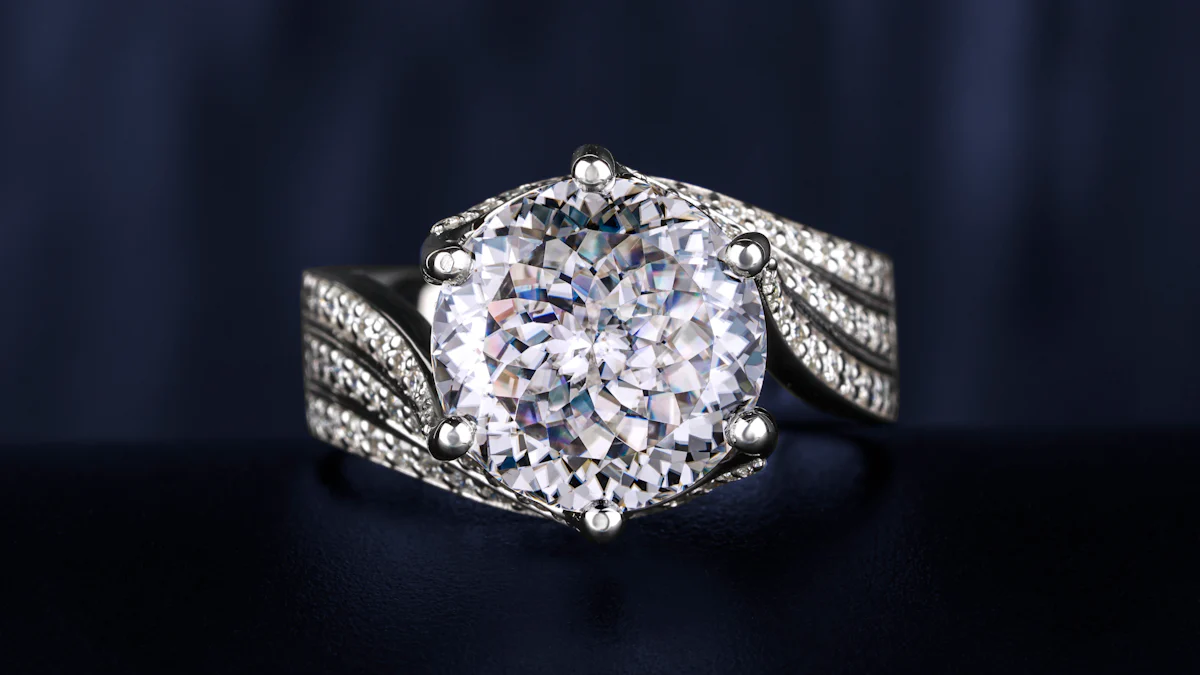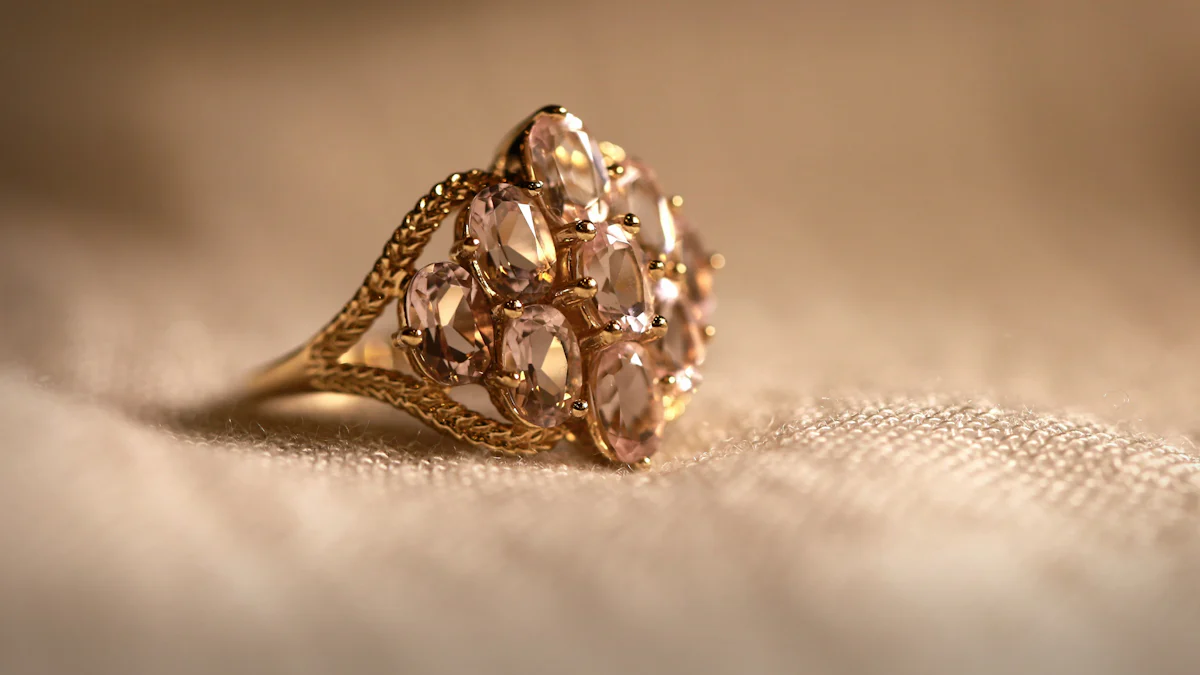3 Reasons Carat Size Matters in Engagement Rings

When choosing an engagement ring, carat size plays a pivotal role in its allure and significance. The average carat size for engagement rings in the United States typically ranges from 1 to 2 carats, with 1.2 carats being a common choice. This size strikes a balance between visibility and elegance, making it a popular option for many couples. Understanding how many carats should an engagement ring be can help you find a ring that not only dazzles but also holds personal meaning. Your choice reflects your unique style and the depth of your commitment.
Key Takeaways
- Carat size significantly impacts the visual appeal of an engagement ring; larger diamonds tend to catch the eye more easily.
- Consider your personal style when choosing carat size; a minimalist may prefer a smaller diamond, while a bold individual might opt for a larger stone.
- The price of a diamond increases with carat size, but quality factors like cut, color, and clarity also play crucial roles in determining overall cost.
- Larger diamonds often hold better resale value, but the quality of the diamond is essential for maintaining its worth over time.
- The carat size of an engagement ring symbolizes commitment; choose a size that reflects your relationship's significance rather than societal expectations.
- Trends show that many couples now prioritize quality over quantity, often selecting smaller, high-quality diamonds for their engagement rings.
Visual Impact of Carat Size

The carat size of a diamond significantly influences its visual appeal. When you choose an engagement ring, understanding how many carats should an engagement ring be can help you make a decision that aligns with your aesthetic preferences and personal values.
How Carat Size Influences Appearance
The Relationship Between Carat Size and Diamond Size
Carat size directly affects the physical size of the diamond. A larger carat weight means a bigger diamond, which often catches the eye more easily. However, the cut, color, and clarity also play crucial roles in the diamond's overall appearance. A well-cut diamond can appear larger and more brilliant than its actual carat weight. This means that even if you opt for a smaller carat size, the diamond can still have a significant presence if it is expertly cut.
The Effect of Carat Size on Ring Presence
The presence of a ring is not solely determined by the carat size. While a larger diamond can dominate the visual space, it is essential to consider how it complements the ring's setting and design. A delicate setting might get overshadowed by a large diamond, whereas a smaller diamond can enhance the elegance of intricate designs. Thus, when deciding how many carats should an engagement ring be, think about the balance between the diamond and the ring's overall design.
Carat Size and Style Preferences
Matching Carat Size with Personal Style
Your personal style plays a vital role in determining the ideal carat size for your engagement ring. If you prefer a minimalist look, a smaller carat size might suit you better. On the other hand, if you enjoy making bold fashion statements, a larger diamond could be the perfect choice. Reflect on your daily style and how the ring will fit into your wardrobe. This reflection will guide you in choosing a carat size that feels right for you.
Trends in Carat Size Preferences
Trends in carat size preferences can vary over time and across cultures. Currently, many brides prioritize quality over quantity, opting for smaller, higher-quality diamonds rather than larger, lower-quality stones. However, the average carat size for engagement rings in the United States remains around 1.2 carats. This size offers a balance between visibility and elegance, making it a popular choice. When considering how many carats should an engagement ring be, it's helpful to be aware of these trends but ultimately choose what resonates with your personal taste and lifestyle.
Carat Size and Ring Value

When you consider the value of an engagement ring, carat size often stands out as a primary factor. It not only influences the price but also affects the ring's overall appeal and investment potential. Understanding how many carats should an engagement ring be can guide you in making a choice that aligns with your financial and emotional investment.
Carat Size as a Determinant of Price
Understanding Price Per Carat
Carat size plays a crucial role in determining the price of a diamond. As the carat weight increases, the price per carat also tends to rise. This is because larger diamonds are rarer and more sought after. When you explore how many carats should an engagement ring be, consider that the price doesn't increase linearly. Instead, it can jump significantly with each additional carat, reflecting the rarity and desirability of larger stones.
How Carat Size Affects Overall Cost
The overall cost of an engagement ring is not solely dependent on carat size. While a larger diamond may command a higher price, other factors like cut, color, and clarity also contribute to the final cost. A well-cut diamond with excellent clarity and color can enhance the beauty of a smaller carat size, offering a more affordable yet stunning option. When deciding how many carats should an engagement ring be, balance your budget with the quality of the diamond to find the perfect ring.
Investment Potential of Larger Carat Sizes
Resale Value Considerations
Larger carat sizes often hold better resale value. If you ever decide to sell or upgrade your ring, a bigger diamond can fetch a higher price. However, it's essential to remember that the resale value also depends on the diamond's overall quality. A larger diamond with poor cut or clarity might not retain its value as well as a smaller, high-quality stone. When considering how many carats should an engagement ring be, think about the potential future value of your investment.
Long-term Value of Larger Diamonds
Investing in a larger diamond can offer long-term benefits. Over time, the value of high-quality diamonds tends to appreciate, especially those with significant carat weight. This appreciation can make a larger diamond a wise investment for the future. As you ponder how many carats should an engagement ring be, consider the lasting value and potential appreciation of a larger stone, ensuring that your choice reflects both your present desires and future aspirations.
Personal Significance of Carat Size
Choosing the right carat size for your engagement ring is more than just a financial decision. It reflects your personal preferences and the unique bond you share with your partner. The carat size you select can symbolize your commitment and resonate with cultural and personal meanings.
Reflecting Personal Preferences
Choosing a Carat Size That Feels Right
When deciding on the carat size, consider what feels right for you and your partner. This choice should align with your personal style and the significance you attach to the ring. Some people find joy in a larger diamond that makes a bold statement, while others prefer a smaller, more understated gem that speaks to their minimalist aesthetic. By weighing expert advice against the personal symbolism of the ring, you can select a carat size that holds meaning, looks beautiful, fits within your budget, and adheres to your partner's style preferences.
Balancing Carat Size with Other Ring Features
The carat size should harmonize with other features of the ring. A well-balanced ring considers the cut, color, and clarity of the diamond, ensuring that each element complements the others. For instance, a smaller diamond with exceptional clarity and a brilliant cut can outshine a larger stone with lesser quality. When pondering how many carats should an engagement ring be, think about how the carat size will interact with the ring's overall design and your personal taste.
Symbolic Meaning of Carat Size
Carat Size as a Symbol of Commitment
In many cultures, the carat size of an engagement ring symbolizes the depth of commitment between partners. A larger diamond often represents a significant promise and dedication. However, the true value lies in the love and commitment it signifies, not just the size of the stone. As you consider how many carats should an engagement ring be, remember that the ring is a testament to your relationship and future together.
Cultural and Personal Symbolism
Carat size has achieved a mythical stature as a status symbol in popular culture. Since the days of Elizabeth Taylor and Richard Burton, where Liz's enormous square ring became iconic, the size of the diamond has often been associated with prestige and success. In movies and TV, characters frequently flaunt their diamond carat size, showcasing it as a sign of wealth and status. Despite this cultural backdrop, your choice should reflect personal significance rather than societal expectations. Consider what the carat size means to you and your partner, and let that guide your decision.
Carat size significantly influences the visual impact, value, and personal significance of an engagement ring. A larger carat weight enhances the diamond's presence, making it a striking statement piece. It also plays a pivotal role in determining the ring's cost and potential investment value. However, the true essence of your choice lies in its personal meaning and the commitment it symbolizes. As you embark on this journey, remember that carat size is a key factor in making an informed decision. Choose a ring that resonates with your heart and reflects your unique love story.
FAQ
What factors should be considered when choosing the carat size for an engagement ring?
When selecting the carat size for your engagement ring, consider several key factors. Personal preference plays a significant role. Think about what style resonates with you and your partner. Budget is another crucial aspect. Larger carat sizes often come with higher price tags. The size of the wearer's finger can also influence the choice. A larger diamond might look overwhelming on a petite finger, while a smaller stone could get lost on a larger hand. Finally, consider the overall aesthetic you desire. Do you prefer classic elegance or dazzling brilliance? Finding the right balance will help symbolize your love and commitment beautifully.
What is the ideal carat size for an engagement ring?
The ideal carat size varies from person to person. It depends on your personal taste, budget, and the desired look of the ring. Many people in the United States choose a carat size around 1.2 carats, which offers a balance between visibility and elegance. However, the perfect size for you might be different. Reflect on what feels right for you and your partner, considering both your lifestyle and personal style.
How does carat size affect the price of an engagement ring?
Carat size significantly impacts the price of an engagement ring. As the carat weight increases, the price per carat usually rises. Larger diamonds are rarer and more sought after, which makes them more expensive. However, the price doesn't increase linearly. It can jump significantly with each additional carat. When deciding on the carat size, balance your budget with the quality of the diamond to find the perfect ring.
Can a smaller carat size still have a significant presence?
Absolutely! A smaller carat size can still make a big impact if the diamond is well-cut. The cut quality can enhance the diamond's brilliance, making it appear larger and more dazzling than its actual carat weight. Additionally, the setting and design of the ring can complement a smaller diamond, enhancing its presence and elegance.
Does carat size influence the resale value of an engagement ring?
Yes, carat size can affect the resale value. Larger diamonds often hold better resale value because they are rarer and more desirable. However, the overall quality of the diamond, including its cut, color, and clarity, also plays a crucial role in determining its resale value. A larger diamond with poor quality might not retain its value as well as a smaller, high-quality stone.
How does carat size relate to the symbolic meaning of an engagement ring?
Carat size can symbolize the depth of commitment between partners. In many cultures, a larger diamond represents a significant promise and dedication. However, the true value of the ring lies in the love and commitment it signifies, not just the size of the stone. Choose a carat size that reflects your relationship and future together.
Are there trends in carat size preferences for engagement rings?
Yes, trends in carat size preferences can vary over time and across cultures. Currently, many brides prioritize quality over quantity, opting for smaller, higher-quality diamonds rather than larger, lower-quality stones. However, the average carat size for engagement rings in the United States remains around 1.2 carats. This size offers a balance between visibility and elegance, making it a popular choice.
How can I balance carat size with other ring features?
To achieve a harmonious look, balance the carat size with other features of the ring. Consider the cut, color, and clarity of the diamond, ensuring that each element complements the others. A smaller diamond with exceptional clarity and a brilliant cut can outshine a larger stone with lesser quality. Think about how the carat size will interact with the ring's overall design and your personal taste.
See Also
Exploring Essential Elements That Influence Diamond Ring Costs
Tips for Selecting the Perfect Rectangular Engagement Ring
Distinguishing Between Promise Rings and Engagement Rings

